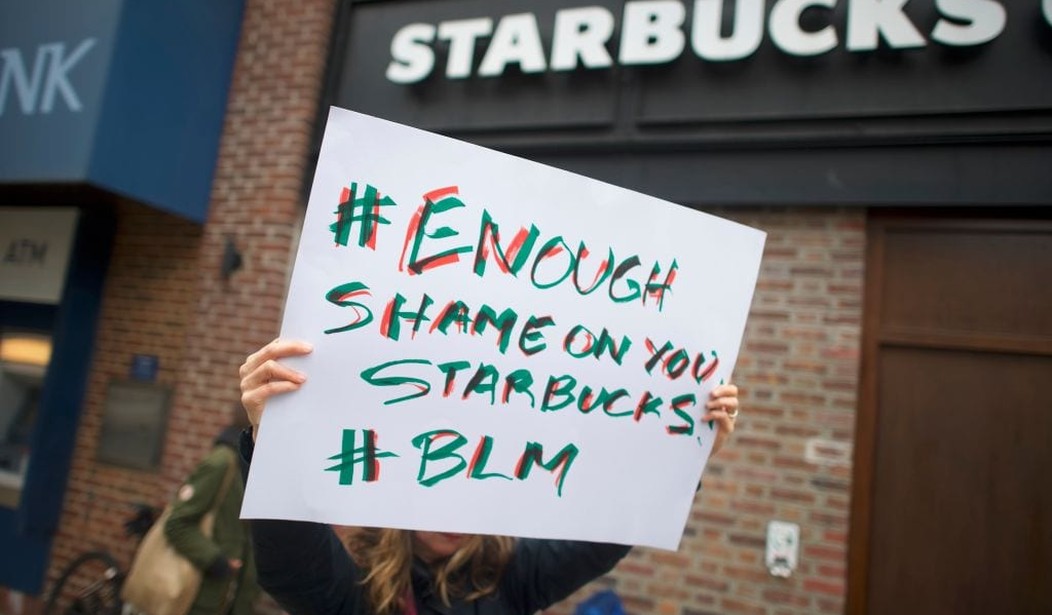No one was shot, no one was tased, no one was beaten with a baton. No one was punched, or kicked, or had even a single hair put out of place. And yet it remains a national news story which, we are told, serves to instruct us on matters of race and the police and how little has changed in the country in the last 50 years.
I refer of course to the April 12 incident at a Philadelphia Starbucks, in which two black men were arrested for trespassing — only to be thrust hours later onto the roster of civil rights heroes. Rosa Parks, meet Rashon Nelson and Donte Robinson.
How utterly silly it all is. Since the arrest, protesters have disrupted the business, the mayor of Philadelphia and the CEO of Starbucks have been publicly flagellating themselves in fits of guilt and shame, and the commissioner of the city’s police department — after initially saying the involved officers had done nothing wrong — has now dutifully joined in the expressions of remorse, presumably after a dressing down from the mayor.
The facts of the case are simple: In the early evening of April 12, Messrs. Nelson and Robinson entered the Starbucks at 18th and Spruce Streets and took a table. Nelson asked an employee if he could use the restroom, for which he needed an entry code. He was told the restroom was for paying customers, and he declined to make a purchase. He then sat down with Robinson, and the manager approached them and asked if she could bring them anything. They declined the offer.
So the manager, apparently in keeping with company policy, called the police and asked to have the men removed. The police arrived and very patiently and civilly explained the situation to Nelson and Robinson. At this juncture, the prudent man might say to himself: “Maybe I should buy something, or maybe I should wait for my friend somewhere else.” Nelson and Robinson exercised neither of these two options, preferring to be arrested and to take a stand for their “rights,” whatever those rights might be.
As they apparently understand them, Nelson and Robinson believe they have a right to occupy a table at a coffee shop without making a purchase or otherwise compensating the business, whose owners might prefer the space be occupied by people willing to, you know, buy something. And now enter the police officers, unwitting players in what was to become the latest act in America’s racial drama. “What’s the problem?” they ask. “Those guys are sitting at a table,” the officers are told, “and they haven’t bought anything and they’re refusing to leave.”
As a matter of law enforcement, this is an easy one.
“Guys,” the cops might have said to Nelson and Robinson, “they asked you to buy something or get out. Are you going to do either and avoid getting arrested?”
“No,” they say.
“Okay,” say the cops, “it’s off to the clink with you, then.”
And then, in a scenario today’s police officers are wearily familiar with, enters the well-meaning, socially conscious bystander, in this case the man Nelson and Robinson were to meet before the unpleasantness began. “Why are you arresting them?” he asks.
“Trespassing,” comes the answer, which is followed by a lecture about discrimination and racism and blah, blah, blah. Why is it, cops wonder, people feel free to interject themselves into someone else’s arrest and pass judgment on its propriety? If I’m arresting Mr. Smith, I’m under no obligation to explain my actions to Mr. Jones unless he is a witness to the crime or somehow otherwise involved. Imagine being at work one day and having some stranger walk in off the street and tell you you’re not doing your job properly. This is what cops deal with every day.
The reactions of Philadelphia Mayor Jim Kenney and Starbucks CEO Kevin Johnson were entirely predictable, even routine for people in their positions facing a racial controversy. They groveled pathetically, hoping the coming maelstrom would not devour them. More encouraging (at first) was the response from Philadelphia Police Commissioner Richard Ross, who stood up for his officers and said they had done nothing wrong. He was soon corrected and made to join the groveling, saying he was unaware, as were the officers, that it was the practice at Starbucks to allow people to lounge about in their cafes without contributing to the overhead. Had the officers known this, said Ross, they would have handled it differently.
How?
When an officer is called to the scene of an alleged trespassing, his only job is to make sure the elements of the crime have been committed, and if so, make the arrest. Yes, he has the option of negotiating a compromise, and indeed the police attempted to do just that. They spoke to the men for several minutes trying to gain their compliance.
But if an accused trespasser refuses to leave, the officer has no choice but to take him into custody.
It is not the officer’s place to engage in racial bean-counting and inquire how many people of various ethnicities have been similarly treated. If the manager didn’t want the men arrested, she shouldn’t have called the police. She’s been ousted from her job, naturally, so she won’t make that mistake again.
I close with a little perspective. The nearby map, created at the Philadelphia Police Department website, shows the 337 crimes reported in the area near 18th and Spruce Streets over the last six months:

Whatever the result of the present furor, whichever scalps are taken to appease the mob, whatever consciousness-raising is done to address “implicit bias” by the purveyors of overpriced coffee, when another six months have passed, will that map look better or worse?
My money is on worse.










Join the conversation as a VIP Member